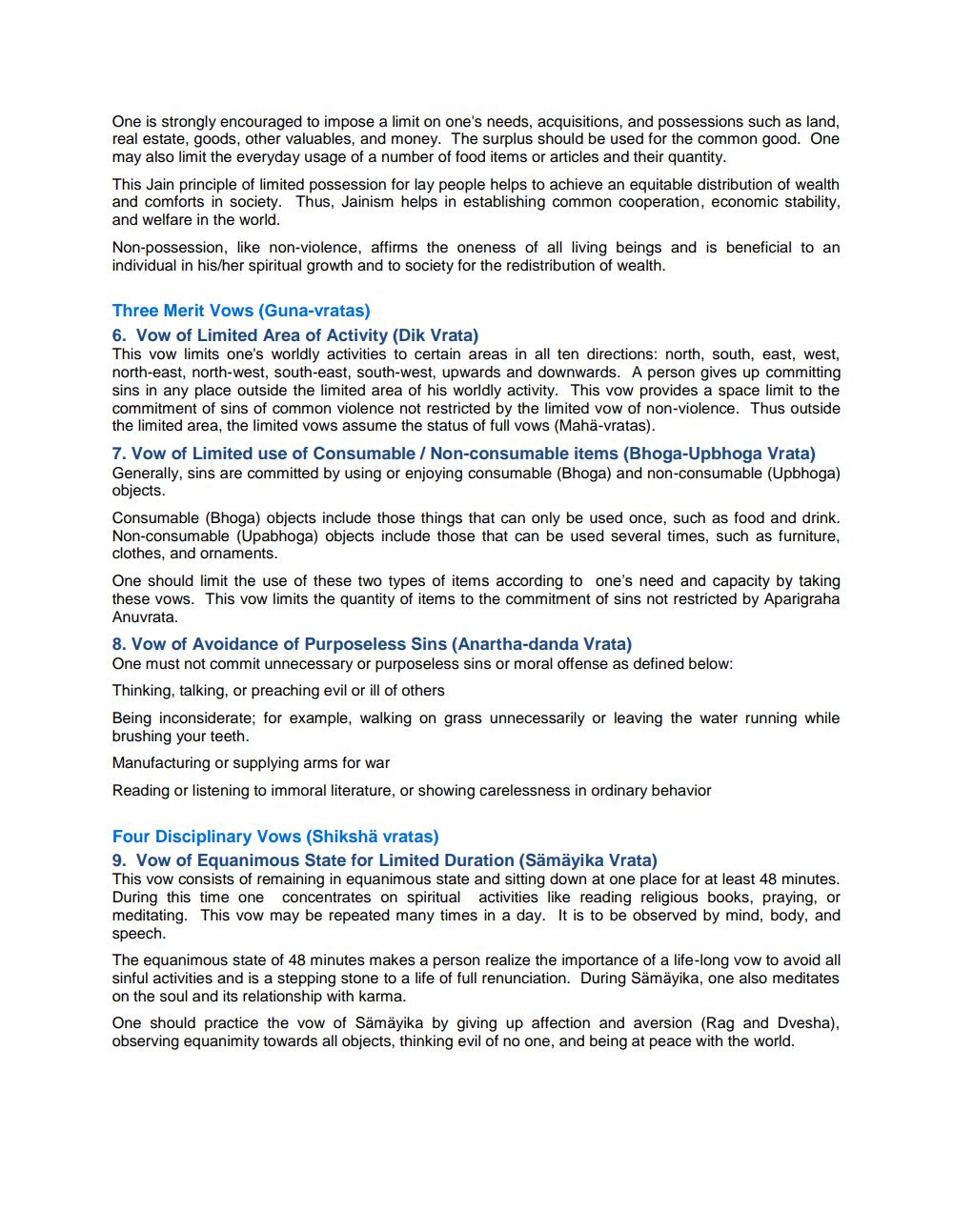Book Title: Twelve Vows of Lay People Author(s): Pravin K Shah Publisher: JAINA Education Committee View full book textPage 3
________________ One is strongly encouraged to impose a limit on one's needs, acquisitions, and possessions such as land, real estate, goods, other valuables, and money. The surplus should be used for the common good. One may also limit the everyday usage of a number of food items or articles and their quantity. This Jain principle of limited possession for lay people helps to achieve an equitable distribution of wealth and comforts in society. Thus, Jainism helps in establishing common cooperation, economic stability, and welfare in the world. Non-possession, like non-violence, affirms the oneness of all living beings and is beneficial to an individual in his/her spiritual growth and to society for the redistribution of wealth. Three Merit Vows (Guna-vratas) 6. Vow of Limited Area of Activity (Dik Vrata) This vow limits one's worldly activities to certain areas in all ten directions: north, south, east, west, north-east, north-west, south-east, south-west, upwards and downwards. A person gives up committing sins in any place outside the limited area of his worldly activity. This vow provides a space limit to the commitment of sins of common violence not restricted by the limited vow of non-violence. Thus outside the limited area, the limited vows assume the status of full vows (Mahä-vratas). 7. Vow of Limited use of Consumable/Non-consumable items (Bhoga-Upbhoga Vrata) Generally, sins are committed by using or enjoying consumable (Bhoga) and non-consumable (Upbhoga) objects. Consumable (Bhoga) objects include those things that can only be used once, such as food and drink. Non-consumable (Upabhoga) objects include those that can be used several times, such as furniture, clothes, and ornaments. One should limit the use of these two types of items according to one's need and capacity by taking these vows. This vow limits the quantity of items to the commitment of sins not restricted by Aparigraha Anuvrata. 8. Vow of Avoidance of Purposeless Sins (Anartha-danda Vrata) One must not commit unnecessary or purposeless sins or moral offense as defined below: Thinking, talking, or preaching evil or ill of others Being inconsiderate; for example, walking on grass unnecessarily or leaving the water running while brushing your teeth. Manufacturing or supplying arms for war Reading or listening to immoral literature, or showing carelessness in ordinary behavior Four Disciplinary Vows (Shikshä vratas) 9. Vow of Equanimous State for Limited Duration (Sämäyika Vrata) This vow consists of remaining in equanimous state and sitting down at one place for at least 48 minutes. During this time one concentrates on spiritual activities like reading religious books, praying, or meditating. This vow may be repeated many times in a day. It is to be observed by mind, body, and speech. The equanimous state of 48 minutes makes a person realize the importance of a life-long vow to avoid all sinful activities and is a stepping stone to a life of full renunciation. During Sämäyika, one also meditates on the soul and its relationship with karma. One should practice the vow of Sämäyika by giving up affection and aversion (Rag and Dvesha), observing equanimity towards all objects, thinking evil of no one, and being at peace with the world.Page Navigation
1 2 3 4
